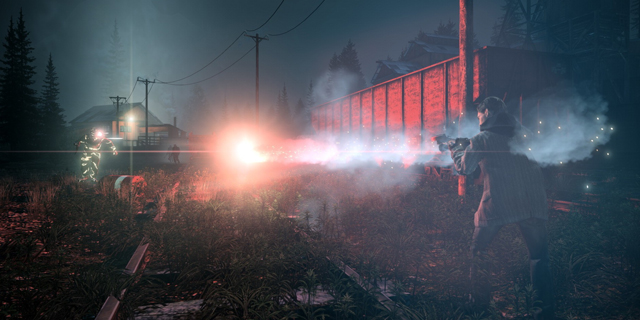
I can picture it now. A couple of young game industry upstarts have finally paid their dues, and are now at the helm of making a brand new game. It’s going to be released on all the systems. They’re talking to each other excitedly about what kind of game they want to make. Ideas are thrown around, gameplay elements are discussed and details are hammered out. They rehearse their pitch; they’re prepared for the studio heads.
Reality sinks in, and it’s not nearly as fun. The young developer’s faces shrink with each passing moment. No, you can’t introduce this wildly revolutionary idea. No, that’s not going to work for us. No, we’re not going to take that risk and no, you’re not going to disagree with us because we’re the money and you’re not.
We like this market segment, so we want you to include lots of blood and gore. The game has to have multiplayer. Your ideas might be good, but how are we going to market that? Where does it fit into our product catalog? We’re looking at these games and they sold really well, so we’ll need you to include a female character who looks like this and a male character wearing something similar to this.
From a business standpoint, this kind of talk makes a lot of sense. Now, more than ever, games are extremely expensive to create. Most games take hundreds or thousands of people working long hours to create. Much like the movie industry, the risk is high, and a failure to sell might mean a lot of people losing their jobs, stock drops and potential company bankruptcy. The scary thing is that these unfortunate results may still occur, even if your game sells millions of copies. In what reality is that fair?
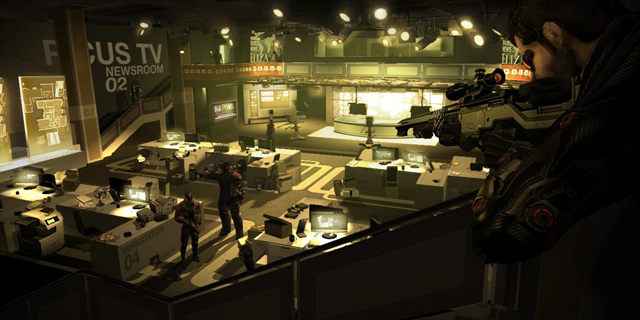
It’s not. It’s not fair that people lose their jobs, it’s not fair that critically-acclaimed games and movies fail commercially, and it’s not fair that successful projects aren’t immune to the results of failure anyway.
Therefore, it’s not a surprise to see some games include content that has no business being there. Absolutely none. It’s as if the code was invaded by a previous game, or it was put in there by a completely different group of people (which happens). You shake your head. Despite the financial ramifications, it’s hard to defend decisions that lead to games including something that they shouldn’t have. Don’t try to be something you’re not. Be yourself.
One of my all time favorite personalities on the planet is a man called Paul Heyman. He was the creative mind behind the now-defunct Extreme Championship Wrestling (ECW) in the 1990s. I could listen to him talk about wallpaper and be intrigued. He has the speaking ability, passion and rage to make you instantly interested. One of his mantras when running ECW was to hide performers’ weaknesses and highlight their strengths. ECW didn’t have the budget that WWF had. It didn’t have the special effects crew to do a ton of video highlight packages, pyrotechnics and other lavish production set pieces. So it didn’t! Heyman knew that if it did, it would look horrible. Hide your weaknesses. Don’t even acknowledge them. Highlight your strengths. ECW had smaller performers, but they could wrestle at a very fast pace. Their fans were bloodthirsty, so they gave them a ton of violence. Barbed wire, flaming tables and skull-crushing chair shots were commonplace, whereas family-friendly storylines and bigger-than-life personalities weren’t.
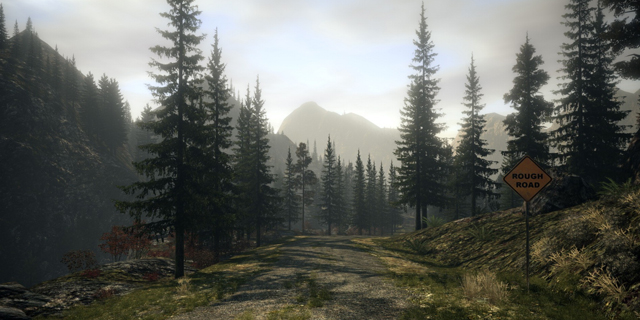
I can think of more than a few instances in games when I knew something didn’t belong. I’m thinking it was a choice based on market research, instead of a decision to enhance the player’s experience. These mechanics aren’t necessarily terrible, but they contrast greatly with the rest of the game.
I’m just now getting a chance to play through Alan Wake. Developer Remedy dubs it a “psychological action-thriller,” and it’s hard to argue that label. Alan and his wife come to Bright Falls, a town in the Pacific Northwest, to give Alan a break from their busy city life and to help him get over his writer’s block. The environmental details are fantastic; if you’ve visited or lived in the area, you know exactly what I’m talking about. The rocks look right. The trees look right. The water is appropriately transparent, and the logging roads and hiking trails are accurate too. Even the signs have an authentic look about them.
Most of the game is played during the dark, in the woods; these sequences are genuinely creepy at times. It’s not a “horror” game, but it will certainly make your skin crawl a few times. You’ll be relieved when you reach a lighted area, away from the foggy, dark wilderness filled with murderous ghosts. Controls are clunky, but not overwhelmingly so. I’m reminded of Remedy’s earlier Max Payne games when it comes to controls and dedication to atmosphere.
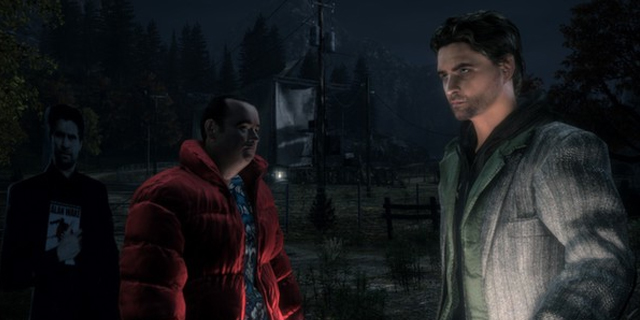
The presentation makes the game feel like a TV series, and it’s a great design. Instead of levels, you get episodes. At the beginning of new episodes, we get “last time on Alan Wake,” which is a nice touch. The game even pokes fun at itself (and The Twilight Zone) by showing the player a TV series called Night Springs, an obvious homage.
Sure, the writing isn’t great and the characters are a bit over-the-top, but that’s fine too. The majority of gameplay is spent in Alan’s head during nightmares anyway, so elements of the supernatural are a welcomed addition. My only complaint with Alan Wake? The cutscenes.
You see, the character models stand there with their mouths half-open, with dead eyes and unrealistic facial features. It’s creepy, and it’s not going for creepy. It’s a shame, because the rest of the game is two-parts hokey, one-part fun. At least it tried to do something cool and creative, and that’s something to be admired. But I can’t ignore the fact that every cutscene makes me cringe. The in-game models look fine; why not use those? I would’ve been less disturbed and much more content to continue the story.
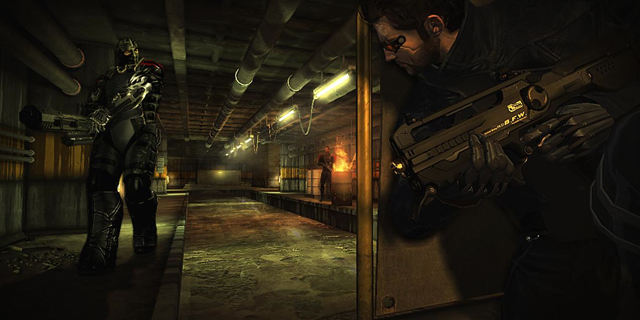
Another prime example of a game trying to be something it’s not is Deus Ex: Human Revolution. The 2011 action-RPG was the Deus Ex game many fans had been waiting for: a cool cyberpunk world, abilities to upgrade, computers to hack and the ability to customize your playing experience based on how you wish to approach the game. Want to be an elite, stealthy hacker? Done. Want to run and gun, shooting everything in sight? You can do that too. It comes down to which “augmentations” you invest your points in, gained by leveling up or purchasing Praxis Kits in various clinics. It fits in well with the game’s theme of eugenics, augmentations, racism, classism, security, freedom and privacy.
But then the boss fights come along. I’ve heard that the original plan wasn’t to have boss fights, but Eidos Montreal received pressure to put them in because, well, games have boss fights. People want boss fights, don’t they? We better put them in the game. Thanks, suits.
They don’t fit at all. It’s a stark contrast to the core theme of choosing how you want to play the game. You’re put in a one-on-one fight against some very tough foes, and you can’t hack your way around them or sneak by them. This removes the choice of flexibility in combat, and it leads to a lot of frustration in an otherwise-stellar game. How am I supposed to beat a guy who looks like a living tank when my guy’s specialty is reading emails quickly?
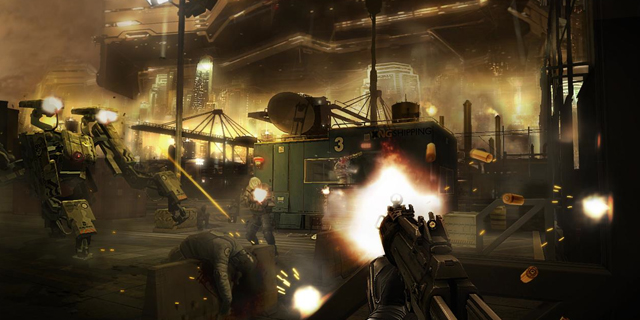
Was it necessary for Metroid Prime 2 to have multiplayer? Don’t get me started on SimCity‘s online features. I’m not saying it’s a bad idea for games to branch out and try new ideas. Some of the best games I’ve played have taken enormous risks, and tried something totally fresh. But there’s a difference between a conscious decision to introduce a new story, gameplay element, visual trick or combat system to force us to think differently and something that was obviously shoehorned late in the development cycle.
It’s easy for me to say this, though. The only thing hovering over my shoulder is my fan, and I don’t have any financial responsibility towards it. The process of creating anything unique and interesting is difficult enough, and I can only imagine the pressure and compromises developers have to make so their game can see the light of day.



















